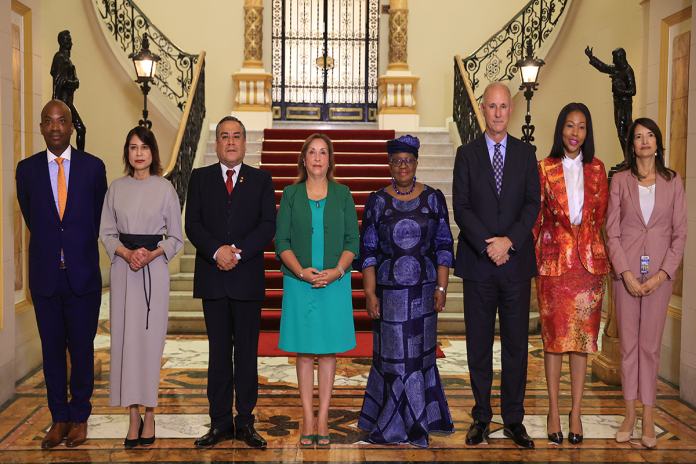SWITZERLAND / LATIN AMERICA – World Trade Organization (WTO) director-general Ngozi Okonjo-Iweala concluded on 6 May a high-level visit to Chile, Uruguay and Peru, where she attended the biannual session of the United Nations System Chief Executives Board for Coordination (CEB) and met with senior government officials, private sector representatives, civil society and academia.
As the WTO marks its 30th anniversary, DG Okonjo-Iweala commended the unwavering support of these three countries to the multilateral trading system and encouraged them to continue working to address the most pressing international challenges, which have been exacerbated by geopolitical uncertainty.
DG Okonjo-Iweala started her week-long visit to the region in Santiago, Chile, where she attended the CEB’s biannual session. Chaired by the UN secretary-general Antonio Guterres, the CEB was held on 2-3 May and brought together the heads of the UN system and associated organizations.
The president of Chile Gabriel Boric welcomed the heads of organizations, who met to consider collective approaches to address global challenges, with a particular emphasis on governance and the rule of law and on how to leverage multilateral solutions to deliver for people.
Participants acknowledged the role that the WTO plays in addressing key global commons issues impacting the achievement of the Sustainable Development Goals (SDGs), including fisheries subsidies, climate change, the digital divide and inclusion.
In Santiago, DG Okonjo-Iweala met with the minister of foreign affairs Alberto Klaveren, the minister of agriculture Esteban Valenzuela and the minister of Energy Diego Pardow; and participated in a fireside chat organized by the WTO chairs programme at the University of Chile moderated by Chilean ambassador to the WTO Sofía Boza. In addition, she held meetings with exporters and women leaders in strategic and innovative economic sectors.
In Montevideo, Uruguay, DG Okonjo-Iweala marked the 30th anniversary of the conclusion of the Uruguay Round that led to the establishment of the WTO in 1995. At an event hosted by the ministry of foreign affairs, she met with vice-president Beatriz Argimón, the minister of foreign affairs Omar Paganini and the minister of livestock, agriculture and fisheries Fernando Mattos.
DG Okonjo-Iweala was also the special guest of an extraordinary session of the Committee of Representatives of the Latin American Integration Association (ALADI), attended by its secretary-general, Sergio Abreu, and ambassadors of its member countries.
DG Okonjo-Iweala visited Lima, Peru, where she had extensive discussions with president Dina Boluarte; and met with indigenous and Afro-descendant women entrepreneurs and held a working session with the minister of foreign affairs Javier González-Olaechea, the minister of foreign trade and tourism Elizabeth Galdo and the minister of agricultural development and irrigation Ángel Manero as well as other senior government officials.
At the invitation of the Pontifical Catholic University and the WTO’s chair programme in Peru, she participated in a high-level dialogue on “the WTO’s role in facing global challenges”, where she engaged with trade experts and students. Additionally, DG Okonjo-Iweala met with representatives of Peruvian exporters and the Chamber of Commerce.
The director-general’s visit was the opportunity to mark the 30th anniversary of the WTO and to acknowledge the region’s contribution to the organization and the global economy. DG Okonjo-Iweala stressed that the region has long been recognized as a staunch advocate for open trade and multilateralism. The commitment of Latin American members to open markets, transparency and fair-trade practices has earned them a respected position in the organization.
DG Okonjo-Iweala counted on these three countries continuing to work on pending issues from the 13th Ministerial Conference (MC13) recently held in Abu Dhabi; and highlighted the need to conclude the second phase of the fisheries subsidies negotiations, to insert the Agreement on Investment Facilitation for Development (IFD) into the WTO’s legal framework and to take a step forward to break the deadlock on agriculture negotiations.
Looking ahead, she underscored the message that the future of trade is services, digital and green — emphasizing it should also be inclusive. Noting that the region is in an excellent position to benefit from a second wave of globalization, DG Okonjo-Iweala encouraged Latin American countries to seize the opportunities offered by market sectors where they can participate in global value chains, such as green hydrogen, critical minerals, pharmaceuticals and digitally delivered services.
DG Okonjo-Iweala called on the authorities to envision a path forward that embraces re-globalization – a concept that is not about reverting to past models, but rather about revitalizing and reimagining the principles of global cooperation, inclusivity and sustainability. It is about reimagining globalization and harnessing the power of trade to address pressing global challenges such as climate change, economic inequality and technological disruption.





